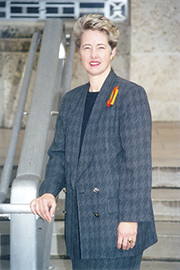The Fourth of July is a time for reflection.
By Annise D. Parker
 E very year, starting May 8 with VE (Victory in Europe) Day, it seems like the country takes a tour through its military history:
E very year, starting May 8 with VE (Victory in Europe) Day, it seems like the country takes a tour through its military history:
–Memorial Day (last Monday in May);
–D Day, commemorating the June 6, 1944, Normandy invasion;
–July 4, Independence Day;
– August 6 and 9, dropping the atom bomb on Hiroshima and Nagasaki;
– and August 14, VJ Day (Victory in J apan, victory in World War II).
Labor Day, the first Monday in September, tends to be lost in the “last chance to vacation before school” arrangements. By fall, it’s a rush to prepare for Thanksgiving and the other holidays of family and faith.
How many of us pause during the holiday season to commemorate Veterans Day on November 11 or Pearl Harbor, December 7?
My father served in the army, the 82nd Airborne. But he was fortunate to have given his service in a time of peace.
As an elected official, I am honored to be invited to parades or other ceremonies honoring those who gave their lives for our freedom. I often get a chance to meet veterans who survived war, but who live with horrible memories or injuries. Each summer, there are fewer and fewer Americans who actually remember these historic events, and more and more Americans who need to understand them.
On July 4, I will pause to wish our great, young country a happy birthday. As world countries go, the US is but a strapping, albeit muscular, youngster only 233 years old.
On July 4, I will proudly salute the flag out of respect for our great democratic ideals, our struggle to fully achieve them and the sacrifice of so many. (In a strange quirk of history, both John Adams, our second president, and Thomas Jefferson, his arch-rival and our third president, died within hours of one another on July 4, 1826. Adams’ last words were: “Thomas Jefferson survives.” But Jefferson had died at Monticello a few hours earlier.)
On July 4, I will acknowledge that few countries can look back and not see violent, shameful chapters in their history; ours includes slavery, the genocide of Native Americans, and the internment of Japanese-Americans during World War II. Modern Germans must live with the Holocaust. Young Japanese must shudder when they read of their country invading China in the 1930s and bombing Pearl Harbor in 1941.
The human race can reach for Heaven or sink to the greatest evil. As a country, we are continually reminded of the injustices of the past and their lingering legacy.
On this July 4, I will salute our new, young president, brimming with hope for a more peaceful world. He’s reaching out to the Muslim world, Iran, Cuba, Venezuela, even North Korea, all the while taking over GM and trying to pull the country out of the worst economic mess since the Great Depression of the 1930s.
On this July 4, I will have hope because the younger generation sees the world through a much more colorful lens. I think back to my elementary school—virtually all white students with few minorities. My youngest daughter’s yearbook looks like a movie cast assembled by a director determined to reflect diversity. Our own children are stirring the great melting pot. Their older brothers and sisters turned out in record numbers to elect a president that reflects the country’s new diversity.
I imagine my 13-year-old daughter Marquitta thinks the Great Depression refers to that dent in the car or a giant sinkhole. I try to relate my family stories to her so she’ll feel like she has a stake in American history. When she’s a little bit older, I’ll make a big bowl of popcorn and entice her to join me watching Ken Burns’ great PBS World War II series and John Adams , the seven-part HBO drama based on David McCullough’s acclaimed 1776 book. She’s already visited both the Houston and national Holocaust museums.
Thank God she didn’t have to live through the Depression and World War II like my grandparents did. And neither of us can imagine what John Adams risked when he voted to send the fledgling 13 colonies, with no real army, to war with the British Empire. But I want her to get a sense of their world, appreciate their sacrifice, and really appreciate how good her American life is, especially compared to much of the world.
Lest we forget! We cannot let today’s young people, or anyone else, think of July 4 or Memorial Day as just another holiday.
A candidate for Houston’s mayor in the November 3 election, Annise D. Parker is Houston’s third-term city controller and one of the highest-ranking openly GLBT-elected municipal officials in the U.S. Her webpage is AnniseParker.com. To receive the controller’s newsletter, send an e-mail to cicely.wynne@cityof houston.net.










